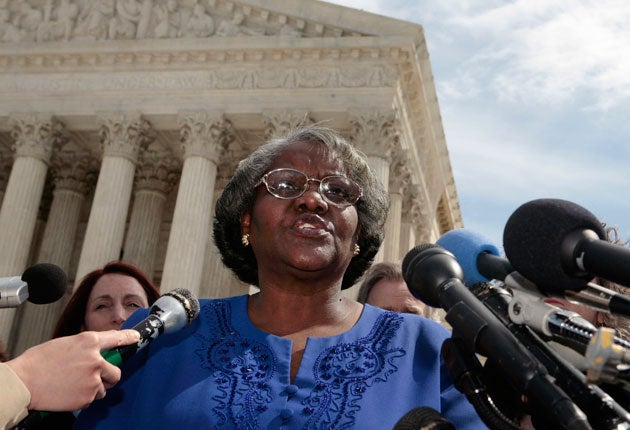Your support helps us to tell the story
From reproductive rights to climate change to Big Tech, The Independent is on the ground when the story is developing. Whether it's investigating the financials of Elon Musk's pro-Trump PAC or producing our latest documentary, 'The A Word', which shines a light on the American women fighting for reproductive rights, we know how important it is to parse out the facts from the messaging.
At such a critical moment in US history, we need reporters on the ground. Your donation allows us to keep sending journalists to speak to both sides of the story.
The Independent is trusted by Americans across the entire political spectrum. And unlike many other quality news outlets, we choose not to lock Americans out of our reporting and analysis with paywalls. We believe quality journalism should be available to everyone, paid for by those who can afford it.
Your support makes all the difference.Handing a valuable and highly symbolic victory to Corporate America, the US Supreme Court has blocked a massive sexual discrimination lawsuit which would have claimed systematic discrimination in the employment practices of the retail giant Wal-Mart.
The nation's highest court yesterday overturned an earlier ruling which would have allowed as many as 1.6 million female Wal-Mart employees to sue the firm for allegedly paying women less than men, and for giving them fewer promotions than their male counterparts. In a decision passed on ideological lines – it was supported by the Supreme Court's five conservative justices and opposed by its four liberal ones – the court ruled that there were too many women in too many different jobs at the company to wrap into a single lawsuit. Individual plaintiffs will still be able to pursue their own discrimination suits. However they will now find themselves in a David versus Goliath battle, with fewer legal resources to draw upon, smaller amounts of compensation at stake and less pressure on Wal-Mart to settle.
The decision was celebrated by the US business community, which feared that any sex discrimination payout by Wal-Mart could lead to a flood of similar suits against other employers. Large class-action lawsuits, in which groups of plaintiffs band together to sue corporations, have in the past led to huge payouts by tobacco, oil and food companies.
Civil rights and women's groups said that it represented a setback for gender equality. "The court has told employers that they can rest easy, knowing that the bigger and more powerful they are, the less likely their employees will be able to join together to secure their rights," said Marcia Greenberg, of the National Women's Law Centre.
Shares in Wal-Mart, which owns the UK supermarket chain Asda, ticked up. A spokesman for the firm said it was "pleased" with the result, noting that the company "has had strong policies against discrimination for many years".
The suit began in 2000, when a "store greeter" from California called Betty Dukes claimed that despite six years of exemplary performance reviews, she had been denied training that would allow her to advance to a more senior position. In her complaint, Ms Dukes said that despite holding 80 per cent of poorly paid supervisory positions, female staff made up just 14 per cent of the firm's managers. Wal-Mart disputed many of her figures and denied that Ms Dukes had been subject to discrimination.
Supreme Court Justice Antonin Scalia said the plaintiffs had failed to satisfactorily demonstrate a company-wide policy of discrimination. "In all, Wal-Mart operates approximately 3,400 stores and employs more than one million people," he wrote. "Because respondents wish to sue about literally millions of employment decisions at once, they need some glue holding the alleged reasons for all those decisions together."
The ruling, which prevents internal company documents from being made public during trial, is the latest example of the right-leaning court reaching a conservative view in a controversial test case. Last year, it voted to reform electoral finance laws to allow corporations to secretly give unlimited funds to political candidates of their choosing.
Yesterday, the court blocked a federal lawsuit by states and conservation groups trying to force cuts in greenhouse gas emissions from power plants. It also refused to hear an appeal from ACORN, the left-leaning community group, over a recent law that banned it from receiving federal money.
Subscribe to Independent Premium to bookmark this article
Want to bookmark your favourite articles and stories to read or reference later? Start your Independent Premium subscription today.

Join our commenting forum
Join thought-provoking conversations, follow other Independent readers and see their replies
Comments